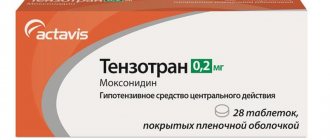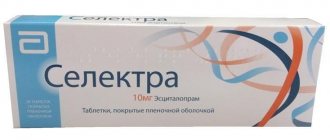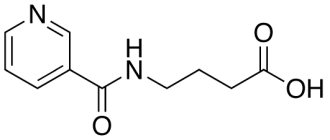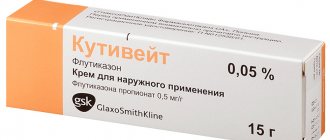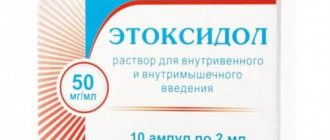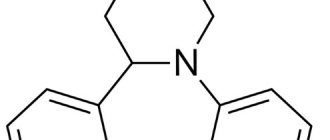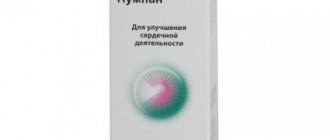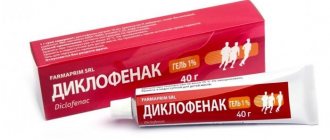Very often, diseases of the genitourinary system occur against the background of cardiovascular pathologies. In these cases, doctors try to select drugs whose interactions will not negatively affect the quality of treatment. One of these universal medicines is Cardura. According to patient reviews, this is an effective drug that generally copes with all the tasks. Why and to whom is it prescribed, does this drug have side effects? You will get the answer to these and many other questions by reading the article.
Release form and composition
Dosage form - tablets: round, biconvex, white, with "Pfizer" engraved on one side and "CN 1", "CN 2" or "CN 4" on the other (in blisters of 7 pcs., in a cardboard pack of 2 blisters, 10 pcs., 3 blisters in a cardboard pack, 14 pcs., 1 blister in a cardboard pack).
The active substance is doxazosin mesylate, its content in 1 tablet with engraving:
- CN 1 – 1.213 mg, or 1 mg of doxazosin;
- CN 2 – 2.43 mg, or 2 mg of doxazosin;
- CN 4 – 4.85 mg, or 4 mg of doxazosin.
Auxiliary components: lactose monohydrate, sodium carboxymethyl starch, microcrystalline cellulose, sodium lauryl sulfate, magnesium stearate.
Pharmacodynamics and pharmacokinetics
The use of Cardura in the treatment of benign prostatic hyperplasia can significantly improve urodynamics and reduce the manifestation of symptoms of the disease. This effect is associated with the ability of doxazosin to block alpha1-adrenergic receptors located in the prostate gland and bladder neck. The effect of using the drug lasts for a long time (for example, up to 48 months).
The use of Cardura in patients with arterial hypertension leads to a decrease in total peripheral vascular resistance and a significant decrease in blood pressure. When taking the drug once a day, the decrease in blood pressure occurs gradually, and a significant antihypertensive effect develops within 24 hours. After oral administration, maximum effect is usually observed within 2–6 hours. When treated with Cardura in patients with arterial hypertension, blood pressure readings in the standing and lying positions are the same.
With long-term use of doxazosin, tolerance to the drug does not develop (unlike non-selective alpha1-blockers). During maintenance therapy, the incidence of tachycardia and increased plasma renin activity is low.
Cardura has a positive effect on the blood lipid profile, significantly increasing the ratio of high-density lipoproteins to total cholesterol and reducing total cholesterol and total triglycerides. This fact is an advantage over beta-blockers and diuretics, which do not have a beneficial effect on these parameters.
A reliable connection has been established between the blood lipid profile and arterial hypertension with coronary heart disease, therefore, the normalization of lipid concentrations and blood pressure that occurs while taking doxazosin can reduce the risk of developing coronary heart disease.
The following effects were observed during doxazosin therapy:
- inhibition of platelet aggregation;
- regression of left ventricular hypertrophy;
- increased activity of tissue plasminogen activator;
- increased sensitivity to insulin in cases of impaired glucose tolerance.
Taking Cardura does not cause the development of side metabolic effects, so the drug can be prescribed to patients with diabetes mellitus, bronchial asthma, gout and left ventricular failure.
The results of controlled clinical studies involving patients with arterial hypertension indicate that taking doxazosin may be accompanied by an improvement in erectile function. Also, patients receiving doxazosin were less likely to experience recurrent erectile dysfunction (compared to patients receiving antihypertensive drugs).
After oral administration of therapeutic doses, the drug is well absorbed: the maximum concentration in the blood is observed after 2 hours. Doxazosin is approximately 98% bound to plasma proteins. The primary metabolic pathways of this substance are hydroxylation and O-demethylation.
The process of removing Cardura from blood plasma is two-phase. The terminal half-life is 22 hours, so the drug can only be taken once a day. Less than 5% of the dose is excreted unchanged.
Pharmacokinetic studies have shown that in patients with renal failure and in elderly patients, the pharmacokinetics of the drug do not differ significantly from those in younger patients with normal renal function.
Results from a clinical study in 12 patients with moderate hepatic impairment showed that with a single dose of doxazosin there was a 43% increase in AUC and a 40% decrease in true oral clearance.
Description of the drug, its general characteristics
"Cardura" is a representative of the group of alpha-blockers that produce a hypotensive effect. These drugs are primarily used to treat blood pressure. Over time, researchers came to the conclusion that the active ingredients of this drug help relieve symptoms that occur in patients with prostate hyperplasia. This disease is also known under another name - prostate adenoma, but in medical practice it is the first option that is most often used.
Judging by the reviews, Kardura really has a positive effect on the patient’s body due to its antihypertensive properties. The medicine is available in tablet form. The cost of the drug depends on the dosage of the active substance (doxazosin) in each pill and the number of tablets in the package. On average, the price of “Kardura” varies between 500-750 rubles. The drug is released only by prescription.
Contraindications
- Liver failure in severe or progressive form;
- Anuria;
- Bladder stones;
- Urinary tract infections;
- Concomitant upper urinary tract obstruction;
- Age up to 18 years;
- Hypotension and tendency to orthostatic disorders, including a history;
- Glucose-galactose malabsorption, lactose intolerance, lactase deficiency;
- Hypersensitivity to the components of the drug and quinazolines.
Cardura is prescribed with caution to patients with aortic and mitral stenosis, heart failure with increased cardiac output, right ventricular failure (caused by exudative pericarditis or pulmonary embolism), left ventricular failure with low filling pressure, cerebrovascular accident, simultaneous use of PDE5 inhibitors (since symptomatic hypotension), liver failure, elderly patients.
Use during pregnancy and breastfeeding is possible if, in the opinion of the doctor, the expected effect of therapy for the mother significantly exceeds the potential threat to the fetus or child.
conclusions
Cardiket belongs to the group of long-acting nitrates. It is prescribed to improve blood supply to the myocardium during angina pectoris, after a heart attack and for some other conditions.
The main side effect is headache. In routine use, hypotension caused by the drug is dangerous, especially in the elderly. The medication can only be taken if it is prescribed by a cardiologist.
There are many domestic names and imported analogues of Cardiket. The abundance of nitrate-based products indicates their effectiveness and demand.
Instructions for use of Cardura: method and dosage
The tablets are taken orally 1 time per day, in the morning or evening.
The doctor prescribes and selects the dose of the drug individually based on clinical indications.
Recommended daily dosage:
- Arterial hypertension: the first 1-2 weeks - 1 mg 1 time per day. After taking the first dose, the patient needs to monitor blood pressure (BP) for the first 6-8 hours to prevent a sharp decrease, especially against the background of previous diuretic therapy. Then, at intervals of 1-2 weeks, a gradual multiple (up to 2 mg, up to 4 mg, up to 8 mg) increase in the daily dose is made until a therapeutically effective dose is achieved. The average dose of the drug is 2-4 mg per day, the maximum is 16 mg;
- Benign prostatic hyperplasia: to prevent the development of syncope and/or postural hypotension, the initial dose is 1 mg. The dose should be increased gradually at intervals of 1-2 weeks, taking into account the presence of BPH symptoms and individual urodynamic characteristics. The average daily dose is 2-4 mg, the maximum is 8 mg.
When combined therapy with diuretics or other antihypertensive drugs, the dose of Cardura must be adjusted taking into account the tolerability of the drug and the patient's condition.
If the drug is interrupted for several days, treatment must be resumed from the initial dose.
In case of renal failure and in elderly patients, no adjustment of the dosage regimen is required.
In case of overdose
Signs that a person has taken too much of the drug are most often a sharp drop in blood pressure and fainting. To help the patient, you need to put him on his back and raise his lower limbs. If severe symptoms of intoxication, cardiac and respiratory problems appear, you should urgently call an ambulance.
Side effects
The use of Cardura for arterial hypertension can most often cause the following side effects:
- From the nervous system: drowsiness, postural dizziness (a sharp decrease in blood pressure while taking the first dose, which can result in orthostatic dizziness, fainting with a rapid change in body position); very often – dizziness, headache;
- From the vestibular apparatus and organ of hearing: vertigo;
- From the respiratory system: rhinitis;
- From the digestive system: nausea;
- Other: weakness, asthenia, fatigue, swelling of the lower extremities.
Adverse reactions noted during marketing studies of the action of Cardura in the treatment of patients with arterial hypertension, the development of which may not be associated with the use of the drug: chest pain, palpitations, tachycardia; uncommon – arrhythmia, angina pectoris, myocardial infarction; very rarely - cerebrovascular accident, bradycardia.
The use of Cardura for benign prostatic hyperplasia can cause the same side effects that occur when treating patients with arterial hypertension.
In addition, post-marketing studies report the following possible undesirable effects of the drug:
- From the cardiovascular system: infrequently - flushing of the face, postural hypotension, marked decrease in blood pressure;
- From the hematopoietic system: very rarely - thrombocytopenia, leukopenia;
- From the urinary tract: infrequently - polyuria, increased urination, urinary incontinence; very rarely - dysuria, nocturia, hematuria;
- From the digestive system: often – dry mouth, abdominal pain, dyspepsia, diarrhea; infrequently – vomiting, flatulence, constipation; very rarely - increased activity of liver enzymes, hepatitis, cholestasis, jaundice;
- On the part of the organ of vision: often – disturbance of color perception; infrequently – atonic iris syndrome;
- From the nervous system: often – paresthesia; infrequently – tremor, hypoesthesia;
- From the vestibular apparatus and organ of hearing: infrequently – tinnitus;
- Metabolic disorders: infrequently – anorexia;
- From the immune system: very rarely - anaphylactic reactions;
- From the musculoskeletal system: uncommon – back pain, arthralgia, muscle spasms, myalgia, muscle weakness;
- From the mental side: often – insomnia, anxiety, agitation; infrequently – depression;
- From the skin: infrequently – skin itching, rash, alopecia, purpura; very rarely - urticaria;
- From the reproductive system: very rarely - impotence, priapism, gynecomastia; very rarely - retrograde ejaculation;
- From the respiratory system: often – rhinitis, shortness of breath; uncommon – nosebleeds, cough; very rarely - exacerbation of existing bronchospasm;
- Laboratory indicators: infrequently – increase in body weight;
- Other: infrequently – pain of different localization.
special instructions
The use of alpha-blockers, especially at the beginning of therapy, in a small proportion of patients causes the development of postural hypotension in the form of weakness, dizziness, and sometimes loss of consciousness (fainting). Therefore, when prescribing the drug, the doctor should give the patient recommendations to exercise caution, including avoiding sudden changes in body position. Be aware of the possibility of orthostatic hypotension, especially in hot weather, during exercise or prolonged standing, and when drinking alcohol.
The drug should be used with extreme caution in elderly patients, since with age the risk of developing orthostatic hypotension and visual impairment, dizziness and fainting increases.
The administration of the drug to patients with BPH is indicated both with normal blood pressure and with arterial hypertension. Normal blood pressure in patients with BPH does not change significantly from the use of the drug. Treatment of BPH in combination with arterial hypertension can be carried out in the form of monotherapy.
For prostate hyperplasia, the drug is prescribed after excluding its cancerous degeneration.
Doxazosin does not affect the level of prostate-specific antigen (PSA) concentration in plasma.
During cataract surgery, patients who are taking or have undergone alpha1-blocker therapy may experience intraoperative atonic iris syndrome. In order to prevent complications during surgery, the patient must inform the surgeon about therapy with alpha1-blockers or their previous use before the operation begins.
Cardura should be prescribed with caution to patients with impaired liver function, avoiding the use of maximum doses.
During the period of use of the drug, it is recommended to exercise caution in all potentially hazardous activities, the implementation of which requires increased attention and high speed of psychomotor reactions, including driving vehicles and machinery.
What patients say
Judging by the reviews, Kardura helps well with prostatitis. And yet, despite the fact that most comments are positive, there are also many in which patients express their dissatisfaction with the length of therapy. Some users praise the drug because it helped them get rid of their illness, while others complain about side effects, especially on the nervous and digestive systems. For some, the reaction to the medicine is so strong that it affects their well-being and performance.
Those who were treated for prostate hyperplasia with Cardura felt relief literally a week after treatment. The men's pain disappeared and urine flow returned to normal. It is also convenient for most patients that when taking pills, there is no need to follow the treatment schedule. You only need to drink Kardura once a day, so you won’t be able to forget to take your medicine on time.
The reason for negative reviews is often the high price of the drug. "Cardura" is 2-3 times more expensive than some alpha-blockers, and given that this drug must be taken for a long time, such treatment requires certain financial costs. According to most people, Cardura is a fast-acting and effective, but expensive medicine.
To avoid the adverse effects of taking Cardura, the patient must inform the attending physician about serious abnormalities such as liver dysfunction, renal failure and other problems. If there are contraindications, Cardura is replaced with another, safer drug in the appropriate dosage. The attending physician has the right in any situation to prescribe medications at his own discretion and adjust the treatment plan. Patients undergoing eye surgery should inform their eye surgeon that they are taking Cardura or have taken this medication in the recent past.
Use during pregnancy and lactation
Animal experiments have not provided data on the teratogenic effects of doxazosin, but the use of extremely high doses (300 times higher than recommended for humans) led to a decrease in fetal survival. The lack of well-controlled, adequate studies does not allow us to draw a conclusion about the safety of the drug during pregnancy or breastfeeding, therefore, when prescribing Cardura during these periods, it is necessary to carefully analyze the benefits to the mother and possible harm to the fetus or child.
Doctors' opinion
Based on reviews of the drug "Kardura", we can conclude that this drug really helps in the treatment of the diseases for which it is prescribed. Experts put it on a par with the best antihypertensive drugs and drugs for the treatment of the prostate. Urologists can literally relieve inflammation and swelling, reduce the size of the prostate and normalize blood circulation in the pelvic organs in just a few days of use.
At the same time, none of the experts considers Cardura a completely safe drug. It must be used with extreme caution, since side effects occur to a greater or lesser extent in almost all patients. Many doctors claim that for prostate adenoma they try to prescribe safer drugs, but if they do not give the desired result, they prescribe Cardura. Doctors recommend that their patients take the medicine for the first time before going to bed, since it causes lightheadedness in many people. At the very least, it is not recommended to take pills while driving or performing technically complex work.
Drug interactions
Concomitant use with PDE5 inhibitors may cause symptomatic hypotension.
The drug should not be prescribed simultaneously with other alpha-adrenergic receptor blockers.
The combination of doxazosin with warfarin, indomethacin, digoxin or phenytoin does not affect their binding to proteins in the blood plasma.
There was no clinical interaction of the drug when used simultaneously with furosemide, thiazide diuretics, beta-blockers, oral hypoglycemic agents, antibiotics, anticoagulants, uricosurics.
The antihypertensive effect of the drug can be reduced by estrogens, sympathomimetic and non-steroidal anti-inflammatory drugs, especially indomethacin.
When combined with epinephrine, arterial hypotension and tachycardia may develop, since Cardura eliminates its alpha-adrenergic stimulating effect; with sildenafil – the likelihood of orthostatic hypotension increases; with inhibitors of microsomal oxidation in the liver, a decrease in the effectiveness of doxazosin is possible, and with inducers - an increase; with other antihypertensive drugs - it is necessary to adjust their dose, since the severity of their effect increases.
Analogs of Cardiket that are available on the Russian market
Long-acting nitrates are a fairly popular group of drugs, so finding analogues and cheaper substitutes for Cardiket will not be a problem.
On the Russian pharmaceutical market you can find the following analogues (medicines in which the active ingredient is also isosorbide dinitrate):
Dinisorb;- Nitrosorbide;
- Isacardine;
- Iso Mac Retard;
- Iso Mac spray;
- Nitrosorbide-Rusfar;
- Cardix;
- Aerosonite;
- Nisopercuten;
- Isoket;
- Isolong;
- Monosan (Czech production).
